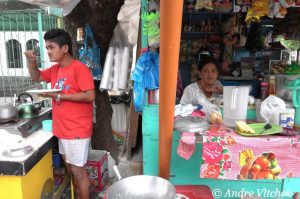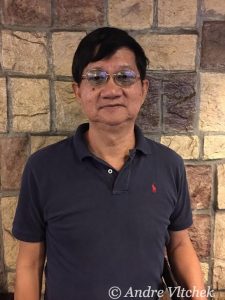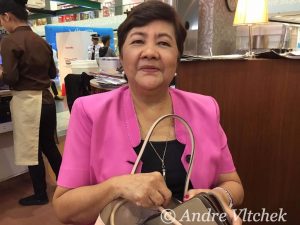From Manila and Davao — There is a sense of change in those narrow and desperate alleys of the Baseco slum in the Philippines’ capital, Manila. For the first time in many years a beautiful, noble lady visited; against all odds she decided to stay. Her name is Hope.
Baseco is a tough, crime-ridden region built from cartons and metal sheets, even rusty containers; everything is thrown together in startling fashion, right near the shipyard.
Here, the lips of the people used to be sealed, expressions on their faces incessantly desperate. Now everyone speaks, some even smile shyly, adults and children, women who look sixty at the age of thirty, as well as tough looking men.
“I support Duterte!” declares Ms. Imelda Rodriguez, who works as a physiotherapist here, through the Department of Social Welfare and Development. “Now children get free education and ‘medical missions’ provide basic medical care. We also receive allowances, and the government provides jobs. We are still lacking electricity, but at least the municipality is providing free drinking water.”
Nearby a teenage girl is washing her hair, using a bucket full of soapy water. It is raining and mud is everywhere. Children are running around barefoot, and some are obviously suffering from malnutrition.
“So much has to be done,” concludes Ms. Imelda. “But so much had been done already.”
People complain about an extremely high crime rate, about drug-pushing gangs. I visit the slums and vast cemeteries inhabited by the poorest of the poor; I also speak to people in shopping malls and at the office towers.
At the South Cemetery, Mr. Rex, a security guard, explains: “President Duterte is strict on the implementation of the rules. Crime is now going down dramatically.”
Self-proclaimed socialist ‘Presidente’ Rodrigo Duterte is enjoying the staggering support of his people, estimated to be well over 70 percent of the population.
“He reads a lot. He was greatly influenced by Hugo Chavez”, explains Roland Simbulan, Professor at the University of the Philippines in Manila. “He is strongly critical of the Western imperialism in Afghanistan, Iraq, Syria, and of course in his country… He is outraged by how the West is treating refugees from the countries it destabilized in the Middle East. He is offering to accept them, to welcome them in the Philippines.”
Duterte has acquired a reputation for lashing out at everything from Western imperialism to President Obama, to Pope Francis (in this staunchly Catholic country), the EU, and the UN. He has threatened to close down all US military bases and to move his country closer to China and Russia. To emphasize his seriousness, he has canceled all joint US–Philippine military exercises.
President Putin is his hero. He is clearly leaning toward the left, and he despises colonialism. He often speaks about the “genocide” committed by the US against his people during the ‘Philippine–American War.’
He refuses to provoke and antagonize China. He is with the poor, introducing and improving social programs. He is gradually releasing political prisoners and actively negotiating peace deals with the Marxist and Muslim guerrillas while seeking peace treaties and territorial compromises with China.
He occasionally explodes, insults, and then backtracks, but he continues to steadily move forward.
“If Duterte moves too fast, he will be overthrown by the military,” explains Prof. Simbulan. “He is an ‘outsider.’ Police and the military are holding grudges against him. Most of the top brass were trained in the US. He tries to keep them engaged, visiting the military camps around the country, explaining why is he releasing political prisoners and why is he inviting left-wing cadres to the government.”
After centuries of colonialism, after the disgraceful collaboration of the military and civilian ‘elites,’ Duterte’s revolution has to be measured, changes gradual.
Prof. Simbulan is cautiously optimistic: “I evaluate Duterte positively. Duterte’s anti-imperialist policy goes beyond rhetoric; it is real and persistent. Even as mayor of Davao, he banned all US–Philippine military exercises there. The US tried to negotiate; they offered plenty of money. They wanted to build a huge drone base in Mindanao, but Duterte refused, resolutely. His track record shows: if there are irreconcilable differences, he’ll always side with the left.”
In Davao, Ms. Luzviminda Ilagan, a former member of Congress and country’s leading feminist, explains: “After Mayor Duterte announced in 2003 that no US military exercises would be allowed in his city, Davao was bombed twice: one bomb exploded at the airport, another at the pier.”
The mainstream media abroad and at home is relentlessly attacking Duterte’s ‘War on crime, drugs, and corruption.’ It is also repeating how he ‘re-buried’ former dictator Marcos at the ‘Hero Cemetery.'”
“Small pushers are resisting arrests,” explains a South Cemetery dweller. “They kill police; they have nothing to lose. It is a real war. Those who keep talking about extra-judiciary killings care only about the criminals, not about us, the citizens.”
That’s the main sentiment expressed in the slums.
“Duterte encourages police to take action,” explains Eduardo Tadem, a leading academic, Professorial Lecturer of Asian Studies (UP). “He is a lawyer, he stays within the legal limits. Some 5,000 were killed so far, but who really does the killing? Vigilantes, motorcycle gangs… The crime rate used to be horrible: killings, kidnapping, petty crime. People are fed-up with the crime. They’d support any action to stop it.”
“If we talk about extra-judicial killings, then we have to prove that the authorities are really ordering them,” explains Ms. Ilagan. “Duterte came with the names: among them some top military and police generals! Now many are being killed. But the international HRs organizations are totally misinterpreting Duterte’s role in all this. Another thing is: the number of people killed in this country is actually decreasing. Before, under Aquino, those murdered were mainly poor farmers, indigenous people, and urban poor; people fighting for their basic human rights. Under Gloria Arroyo, the foreign mining companies were even given permission to kill protesters. All this is over now.”
The President is defiant, especially when criticism comes from abroad: “I do not kneel down before anybody else, except the Filipino in Quiapo walking in misery and in extreme poverty and anger.”
Eduardo Tadem believes that burying former dictator Marcos at ‘Hero’s Cemetery’ was a gross miscalculation. “Marcos brought this country to ruins.” But he says that the act was not ideological; it was about pragmatism and ‘personal ties’. Duterte made a promise to the family of Marcos. Before the elections, he didn’t accept a member of the Marcos clan as his vice presidential running mate, but he needed the votes of his followers.
“Marshall Law was the US project,” exclaims Dr. Reynaldo Ileto, a leading historian. “But now they only talk about Marcos. Under Ramos and others, there were terrible abuses, too. The cemetery carries the ‘hero’ name, but actually, almost all former presidents are buried there. Focus on Marcos is deliberate: to raise controversy, to discredit Duterte, and to avoid real issues. Many people from the left, even Marxists, were actually working with Marcos. Duterte’s father was a minor minister in Marcos’ cabinet, but his mother was a resistance figure.”
“Duterte’s mother played an extremely important role in the protest movement against Marcos,” confirms Ms. Ilagan. “She was vocal, fearless, and she had great influence on her son. Let’s also remember that during Marshall law Duterte served as a prosecutor in Davao, and he saved many prisoners, many activists”.
Dr. Ileto’s gives a personal ‘verdict’ on President Duterte: “He is doing a great job. He is being sensible to China, while the West is doing all it can to antagonize China. This is an essential issue. Remember our past: President Arroyo visited China first, before she went to the US. She moved closer to China. She was punished: they got her indicted for ‘corruption.’
We discuss Argentina, Brazil and Ukraine and how the West invents or exaggerates ‘human rights’ and ‘corruption’ matters to ostracize, even to overthrow legitimate governments.
Now the process to discredit the rebellious President of the Philippines is already in full swing. Would Duterte’s liberal Vice-President Leni Robredo (recently expelled from the cabinet), be elevated by the Western establishment to stardom? She is pro-Washington, she is against all Duterte’s ‘wars,’ and, above all, she is against his increasingly close relationship with China. She could soon join the band of the ‘Color Revolutions’ leaders, as she leads the “yellow” Liberal Party.
“In Mindanao, people say ‘Imperialist Manila,'” explains Ms. Ileto. “Duterte is from the South, he is an anti-imperialist, he defends his people, and the elites in Manila hate him for that. He swears, curses, after all, he is Visaya – we are like that – open and outspoken. First, they thought he was a joke, but he won, he touched the people. He speaks their language; he is real.”
“What will happen if he is overthrown or killed?” I ask point blank, here in his city of Davao, on Mindanao Island.
“There would be a real danger of explosion; even of a civil war,” I am told. “And people of Mindanao would be at the forefront.”
• First published by RT
• All photos by Andre Vltchek
















